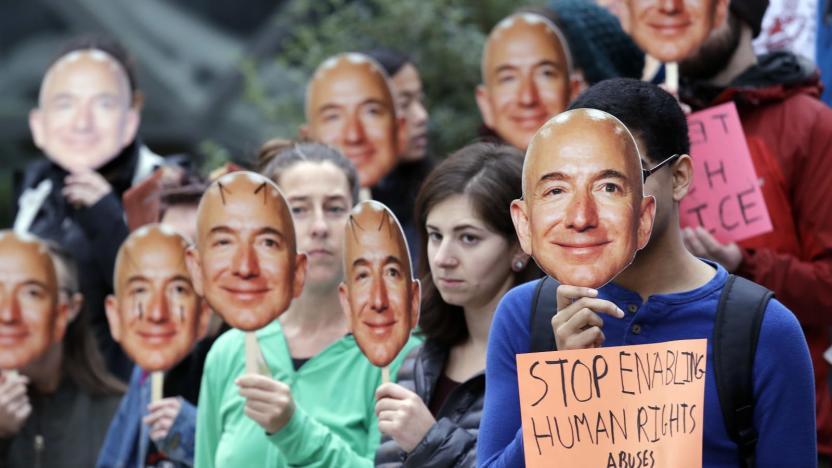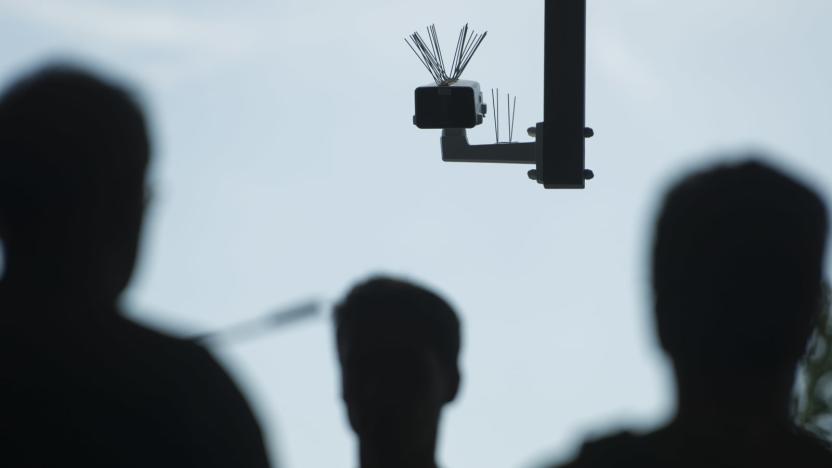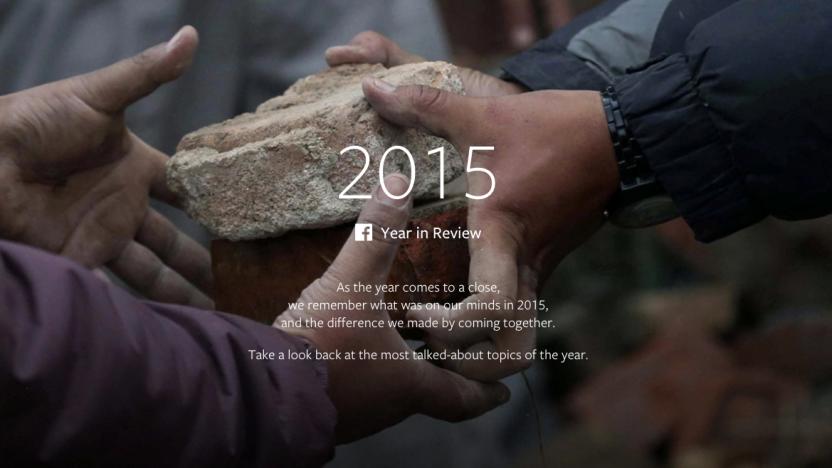CivilRights
Latest

Amazon shareholders will vote to ban facial recognition tech
Amazon shareholders will vote to ban the company's controversial facial recognition technology next week in a key symbolic process. Amazon set the vote date, May 22nd, after the US Securities and Exchange Commission (SEC) rejected the company's request to have the motion squashed. A group of shareholders, led by nonprofit Open MIC, asked Amazon's board to stop selling the deep learning tools until a third party can confirm "it does not cause or contribute to actual or potential violations of human rights."

Shareholders ask Amazon to halt sales of facial recognition tech
A group of Amazon shareholders has filed a resolution requesting the company stop selling its facial recognition technology to government agencies until a review can determine whether it has the potential to violate civil rights. Organized by the non-profit Open MIC and filed by the Sisters of St. Joseph of Brentwood, the resolution is supported by a total of five shareholder groups that hold $1.32 billion of Amazon shares.

Facebook releases an update on its civil rights audit
In May, Facebook agreed to conduct a civil rights audit, and now the company has released an update of its progress. Headed by civil liberties leader Laura Murphy, the audit has so far engaged with dozens of civil rights organizations in order to identify which issues the company should focus on. And in her report, Murphy highlights some of the work that was done this year and what the audit will tackle in 2019.

Facebook reportedly agrees to share an update on its civil rights audit
The civil rights advocacy group of Color of Change released a statement today describing a meeting it had with Facebook leaders regarding a civil rights audit the organization has demanded from the social network since 2016. At the meeting, attended by Facebook COO Sheryl Sandberg and Color of Change President Rashad Robinson, the company agreed to publicly release an update on the audit by the end of the year. "Facebook, like much of Silicon Valley, desperately needs a cultural transformation," Robinson said in a statement. "Leaders must see that addressing the needs of Black users and employees, collaborating with civil rights groups to correct existing issues and rooting out the internal forces hostile to civil rights are essential for the company's future success."

Apple, Google and others denounce Trump’s transgender policy
More than four dozen global brands pushed back against a report that the Trump administration would require a person's gender be defined by their birth anatomy, a move that could endanger federal protections for more than a million Americans who don't identify with the gender assigned to them at birth.

Twitter is considering a transparency report on suspended accounts
As part of his testimony before the Senate Intelligence Committee today, in a hearing titled "Foreign Influence Operations' Use of Social Media Platforms," Twitter CEO Jack Dorsey said that his company is exploring the idea of a transparency report for suspended accounts. He said that, while details of what this document would look like or what information exactly it could include are still being worked out, it's something that's heavily on his mind. Twitter already has a bi-annual transparency report which discloses how many accounts it removes for promoting terrorism, and Dorsey said doing something similar for suspended accounts would only be a matter of figuring out its implementation.

Amazon is selling facial recognition tech to law enforcement
If you're nervous about the privacy implications of Amazon's camera technology, there might be a good reason for it. The ACLU and a coalition of civil rights groups are calling on Amazon chief Jeff Bezos to stop offering Rekognition facial detection system to government customers after learning that the company is actively helping law enforcement implement the potentially invasive technology. Police in multiple regions have partnered with Amazon on surveillance projects, including an Orlando proof-of-concept that lets Amazon search for "people of interest" through city cameras as well a Washington County, Oregon initiative that lets officers scan people to see if they turn up in a mugshot database.

Facebook will conduct civil rights audit following bias allegations
Facebook has come under fire lately for accusations of racial and political bias, and it's determined to address both of those claims head-on. The social media giant has committed to independent investigations that will scrutinize both its civil rights record and its alleged anti-conservative political bias. Civil liberties leader Laura Murphy will lead a civil rights audit with input from groups like the Leadership Conference. Meanwhile, former Republican Senator Jon Kyl will run a conservative bias advisory partnership that will also see Facebook executives meeting with the right-wing think tank Heritage Foundation.

San Francisco airport can now record all visitors' license plates
When you drive to the airport, you expect a certain amount of tracking, if just from security cameras. However, San Francisco International Airport might be taking things a step too far. The travel hub recently received approval from the Airport Commission to collect the license plate info for everyone who uses its roads and garages, storing that data for over 4 years. It's ostensibly meant for collecting revenue from parking and commercial drivers like taxis, but SFO has permission to release that info to both local law enforcement and the FBI.

Transgender protection rollback sparks opposition from tech
On Wednesday, the Trump administration announced that it would roll back federal protections for transgender citizens and require states and local school boards to decide how (or, more accurately, whether) they would enforce these people's civil rights. Given that Silicon Valley tech companies routinely portray themselves as paragons of diversity and tolerance, these companies would surely be equally incensed at the government's current attempts to regulate where children can pee. However, the responses so far have failed to directly address the president's recent actions, instead generally relying on passive statements that extol their valuation of diversity and inclusion.

Tanzania charges man with 'insulting' its leader on WhatsApp
Attempts to clamp down on free speech online aren't just limited to public social network posts. Tanzania has charged five men with insulting President John Magufuli on social networks, one of whom (lecturer Dennis Mtegwa) is accused of offending the country's leader in a WhatsApp discussion group. The other four have also been charged with using Facebook and WhatsApp posts to turn people against the police. All five have denied the charges and are currently free on bail.

Facebook's 2015 review video puts the year in perspective
One of the internet's greatest achievements is its ability to connect disparate global communities in discussion and, at times, compassion -- and a lot of that conversation takes place on Facebook. The company's Year in Review, a video and list released today, outlines the top 10 stories of 2015, including the US presidential election, Paris terrorist attacks, Syrian civil war and refugee crisis, Nepal earthquakes, Baltimore protests, and marriage equality. It's a snapshot of a year with extreme peaks and valleys, ultimate joy and devastation.

India will partly reverse its online porn ban
It looks like the Indian government's broad attempt to block internet porn didn't last long. Officials say they'll lift a ban on many of the 857 sites just recently cut off for being "immoral and indecent." They should be fine as long as they don't promote child porn, the country's communications minister says. It's not certain what prompted the change of heart, but a public backlash didn't help -- critics argued that the censorship violated personal liberty and wouldn't be very effective given the ease of finding alternatives. As it stands, Indian researchers argue that it's more important to tackle sexual violence than keep images of consenting adults off of people's screens. [Image credits: AP Photo/Rajesh Kumar Singh]

India blocks hundreds of sex sites in the name of 'decency'
India's government has been threatening to crack down on porn in the country, and it looks like the administration has made good on its word. The Department of Telecommunications has blocked 857 sex sites (including everything from Fleshbot's blog through to hookup site Adult Friend Finder) in the name of "decency." While the restrictions may not affect everyone -- some mobile users report unfettered access, for example -- they're definitely noticeable on at least some landline internet providers. Officials claim that India's IT Act grants them the authority to block content if it preserves "public order" and prevents sites from inciting crimes.

Recommended Reading: Wearing Google Glass every day for two years
Recommended Reading highlights the best long-form writing on technology and more in print and on the web. Some weeks, you'll also find short reviews of books that we think are worth your time. We hope you enjoy the read. Two Years Through the Looking Glass by Allen Firstenberg I'm pretty sure there's nothing I've done every day for the last two years. Maybe I've taken a vitamin, but I'm sure I missed a day here or there. Allen Firstenberg is way more dedicated to habit than I am, though. He's been wearing Google Glass since he received the headset two years ago and has a load of observations about the past, present and future of the tech.

EFF looks at rules controlling NSA surveillance, sees big risks for Americans
While The Guardian undoubtedly garnered attention when it posted court papers detailing data collection rules for the NSA, it also provided a lot of detail that isn't easy to digest. The Electronic Frontier Foundation is more than willing to break down those rules, however -- and it doesn't like what it sees. It's concerned that there are too many exceptions letting the NSA store and transmit private information, with little oversight preventing investigators from seeing more US data than they should. Allegedly, the rules could defy American rights to anonymous speech; they may also violate attorney-client privileges both inside and outside of the US. We have a hunch that the NSA might disagree with this interpretation of its authority, but you can see all the points of contention for yourself at the link below. [Image credit: David Drexler, Flickr]

Twitter hands over Occupy Wall Street protestor's updates under pressure
Twitter has been building a modest reputation for siding with the little guy (or girl) when it comes to communication privacy, and it just demonstrated how far it's willing to go in a showdown with Manhattan's Criminal Court over a demand to hand over tweets from Occupy Wall Street protestor Malcolm Harris. The social network has been pushed into delivering the claimed evidence, but only as it faced a deadline and the threat of a fine -- it even tried one last request for a stay before producing hard copies of the messages. However much the handover affects Harris' chances at winning during trial, it emphasizes that public posts have serious consequences -- companies ultimately can't shield you from the law. [Image credit: Paul Stein, Flickr]

FBI reportedly pressing for backdoor access to Facebook, Google
Investigators at the FBI supposedly aren't happy that social networks like Facebook or Google+ don't have the same kind of facility for wiretaps that phones have had for decades. If claimed industry contacts for CNET are right, senior staff at the bureau have floated a proposed amendment to the 1994-era Communications Assistance for Law Enforcement Act (CALEA) that would require that communication-based websites with large user bases include a backdoor for federal agents to snoop on suspects. It would still include the same requirement for a court order as for phone calls, even if US carriers currently enjoy immunity for cooperating with any warrantless wiretapping. As might be expected, technology firms and civil liberties advocates like the Electronic Frontier Foundation object to deepening CALEA's reach any further, and Apple is thought to be preemptively lobbying against another definition of the law that might require a government back channel for audiovisual chat services like FaceTime or Skype. The FBI didn't explicitly confirm the proposal when asked, but it did say it was worried it might be "going dark" and couldn't enforce wiretaps. [Image credit: David Drexler, Flickr]

Apple a part of $75B civil rights, fraud lawsuit
Apple is a defendant in an unusual lawsuit that accuses the company of "outrageous and reckless and extreme acts against the plaintiff, with the massive theft of the plaintiff's copyrighted works, grossing millions if not billions of dollars." The plaintiff, David Louis Whitehead, filed his claim in US District Court in the Western District of Arkansas and is asking for US$75 billion in relief and another $5 billion in damages. Whitehead has a long list of earlier lawsuits and cites many of these cases in this current filing. The suit takes a turn for the weird when you look at the eclectic group of defendants cited by Whitehead. The list contains businesses, celebrities, banks and Hollywood studios. Even the current President and former Presidents of the United States were cited because they supposedly appointed judges to thwart Whitehead's legal actions. Besides Apple, Whitehead also lists Oprah Winfrey, Mike Meyers, Mel Gibson, Viacom, Disney, Bank of America, Comcast, Microsoft and more in this frivolous lawsuit. The reasons for Apple's inclusion in this lawsuit were not mentioned, and Apple has not commented on this lawsuit. [Via MacObserver]

American student finds GPS tracker stuck to car, FBI shows up to reclaim its 'federal property'
Mechanics spot strange things stuck under cars all the time, but when 20-year-old Yasir Afifi's ride was put up on lifts his shop found something that hadn't been kicked up from the road: a cylindrical tube connected to a device with an antenna. An extremely paranoid person would think they'd found a bomb, but the truth isn't much better. It was an FBI tracking device. Afifi posted pictures and his story on Reddit while a friend contemplated cunning things to do with it, sticking it to someone else's car or selling it on Craigslist. They didn't have long to ponder long before two "sneaky-looking" people were spotted outside his apartment. Afifi got in his car and drove off, only to be pulled over by FBI agents who demanded the device back, threatening "We're going to make this much more difficult for you if you don't cooperate." Now, we've already given our opinions on using GPS technology like this and, while it's unknown whether these agents had a warrant to place this device, the 9th US Court of Appeals recently made one unnecessary for this sort of thing. The ACLU is working with Afifi to fight that ruling, and for now we're hoping that he, who is an American with an Egyptian father, is currently able to hit the town without agents following his every move. However, at this point they may not need a tracker: one agent who retrieved the device took the time to list off his favorite restaurants and even congratulated him on his new job.








